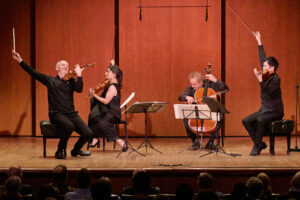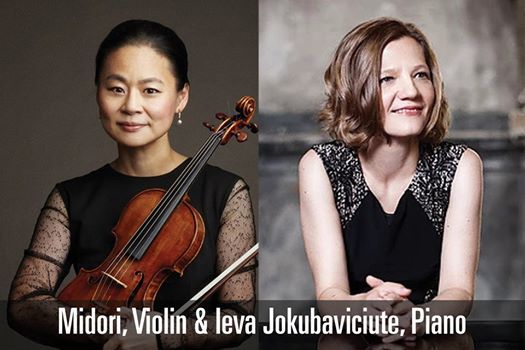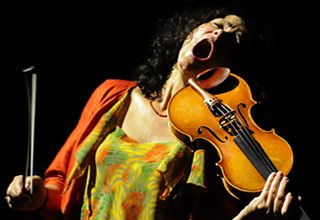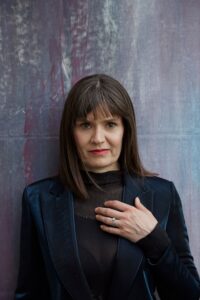
It’s rare for a new work to have even a second performance, but Kati Agócs’ Rapprochement received nine plays in a single day. Agócs was commissioned by the Banff International String Quartet Competition to write a composition that each quartet would be required to play in the 2025 competition.
The title of her nine-minute piece means “to bring together.” Agócs, in a pre-performance conversation with BISQC director Barry Shiffman, explained that it is in variation form, in which the harmonic underpinning is important to the melodic line. It’s a lyrical piece, and the instructions call for a lot of fluidity with beautiful solos for each member of the quartet. In an introductory video, she said, “The score leaves room for players to shape nuances of dynamics, articulation, balances, and color.” Agócs worked individually with the competing quartets as they learned the piece.
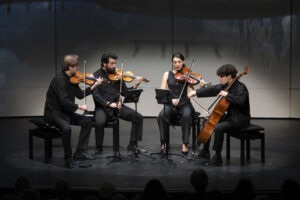
There were nine quartets participating in 2025 BISQC: Viatores Quartet (from Berlin), Arete Quartet (Seoul), Cong Quartet (Hong Kong), Quatour Magenta (Paris), Quatour Elmire (Paris), Quartett HANA (Munich), Nerida Quartet (Bremen), Quartet KAIRI (Salzburg), and Poiesis Quartet (Cincinnati). Naturally, each gave its own spin on the work. This was a great opportunity for the audience to hear the ensembles back-to-back-to-back. Over the previous four days, the quartets performed one round of works from the romantic era and one round of a quartet by Franz Josef Haydn paired with a 21st century work. You can watch all of the performances on demand on the BISQC website.
I asked Shiffman why he chose to program all of the premiere performances of Agócs’ piece in a single concert. He said, “Look at the audience. It is the most popular concert of the competition.” He said that most of the audience are not avid new music listeners, and it’s helpful to them to hear many interpretations at the same time.
The Arete Quartet pulsated the rhythms as if inhaling and exhaling. Cong gave special attention to a steady eighth note all through the piece, which was one of the instructions in the score. Magenta leaned into the dissonances at the opening, and gave the rhythms a jaunty swing. Elmire made the most of the hemiola rhythms near the beginning and gave the jolly rhythms a sensual twist, ending with panache.
HANA did a great job of “singing” lyrically (another instruction in the score). Nerida gave the ethereal opening an especially mystical feel and their upward glissandos were especially gossamer. KAIRI seemed to have an especially good handle on the transitions between sections, and Poiesis showed a confidence above the others. They were especially birdlike in the chirps that came just before upward glissandos, and did a great job of varying the sound of each iteration of the theme.
Agócs, who is Canadian-American-Hungarian, teaches at New England Conservatory in Boston. She has written two other quartets, Tantric Variations for Cecilia Quartet and Imprimatur for Jupiter Quartet, both previous BISQC winners.
The first Banff International String Quartet Competition was in 1983 and it’s been held every three years since then. It takes place at the Banff Centre for Arts and Creativity which is in Banff National Park, a breathtakingly beautiful location in the Canadian Rockies. The winner of the 2025 competition will be announced on August 31.
